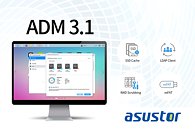Tuesday, March 27th 2018
ASUSTOR Launches ADM 3.1 Today
ASUSTOR Inc. is launching ADM 3.1 today. This upgrade enhances and adds many features to meet the needs of customers from feedback. These include but are not limited to SSD Caching for accelerated hard disk performance, RAID scrubbing to keep hard drives healthy, Automatic RAID Repair, management of enterprise accounts and a new LDAP Client. Download ADM 3.1 today and experience the full range of new features.ADM 3.1 New Features:
SSD Caching - SSD-like performance with traditional hard drives.
Traditional hard drives are not as fast as SSDs, but their capacity and durability are not as good as traditional hard drives. The best way to combine the best of both worlds is with SSD caching. The SSD cache feature saves frequently accessed file data on a hard disk and stores it on an SSD, thereby optimizing the response time and transfer rates of users when accessing data. ASUSTOR NAS* supports read-only access and read-write cache mode. After following the installation wizard, you will be able to easily access your storage spaces and achieve the best balance of capacity and performance.
Supported Models: AS31/32/50/51/61/62/63/64/70 series
Supporting LDAP Clients - Centralized control now more convenient than ever.
LDAP, also known as Lightweight Directory Access Protocol is mainly used for unified management of accounts and passwords. Using LDAP technology can more efficiently manage user authentications or computer resource permissions across the enterprise. ASUSTOR NAS originally only supported Microsoft's Windows Active Directory service. ADM 3.1 adds an LDAP client. Users can easily add an ASUSTOR NAS to their existing LDAP server providing easier ways to manage helps improve productivity.
RAID Scrubbing - Keeping hard drives healthy.
RAID Scrubbing detects the integrity and consistency of RAID 5 and RAID 6 drive data. Regular use of this feature can help you confirm the integrity of your data and fix inconsistencies. If a problem that cannot be repaired is found, your NAS will immediately warn you so that you can respond to unexpected issues early.
For more information, please go to the official website: www.asustor.com
SSD Caching - SSD-like performance with traditional hard drives.
Traditional hard drives are not as fast as SSDs, but their capacity and durability are not as good as traditional hard drives. The best way to combine the best of both worlds is with SSD caching. The SSD cache feature saves frequently accessed file data on a hard disk and stores it on an SSD, thereby optimizing the response time and transfer rates of users when accessing data. ASUSTOR NAS* supports read-only access and read-write cache mode. After following the installation wizard, you will be able to easily access your storage spaces and achieve the best balance of capacity and performance.
Supported Models: AS31/32/50/51/61/62/63/64/70 series
Supporting LDAP Clients - Centralized control now more convenient than ever.
LDAP, also known as Lightweight Directory Access Protocol is mainly used for unified management of accounts and passwords. Using LDAP technology can more efficiently manage user authentications or computer resource permissions across the enterprise. ASUSTOR NAS originally only supported Microsoft's Windows Active Directory service. ADM 3.1 adds an LDAP client. Users can easily add an ASUSTOR NAS to their existing LDAP server providing easier ways to manage helps improve productivity.
RAID Scrubbing - Keeping hard drives healthy.
RAID Scrubbing detects the integrity and consistency of RAID 5 and RAID 6 drive data. Regular use of this feature can help you confirm the integrity of your data and fix inconsistencies. If a problem that cannot be repaired is found, your NAS will immediately warn you so that you can respond to unexpected issues early.
For more information, please go to the official website: www.asustor.com

1 Comment on ASUSTOR Launches ADM 3.1 Today
1. i have no idea what ADM 3.1 is or does
2. "Traditional hard drives are not as fast as SSDs, but their capacity and durability are not as good as traditional hard drives " Clearly an engrish fail, but are they telling me that HDDs are slower than SSD's while also being inferior to... HDD's?